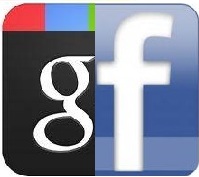Google Plus has yet to launch pages for brands, but that hasn’t stopped people from making comparisons with the live version on Facebook, and now so will we. JWT New York emerging media strategist Zeny Huang penned one for Mashable, focusing on brand pages, and we beg to differ.
Huang zeroed in on four topics in comparing brand pages on the two social networks: search, customization, analytics, and the fact that Google can learn from Facebook. Again, Google Plus is still in beta, and brand pages don’t exist yet, nor do some of the hypothetical features she mentioned.

On search, Huang makes a fair point in saying:
A major challenge with driving paid search ads to a Facebook page is that the Facebook.com domain generates a lower click-through rate (CTR), most likely due to people finding the domain irrelevant to their query… it would be crazy for search giant Google not to have search benefits for Google Plus brand pages.
It’s difficult to argue her statements, especially the latter one, as while Google has expanded its reach throughout the online world, its search engine remains the backbone of the company. Still, even with Google Plus in beta and more features on the way, the lack of searchable public content thus far is puzzling.
On customization, Huang is purely speculating, as ads don’t yet exist on the beta social network. She suggests that once brand pages launch, managers may be able to use YouTube’s model and place ads and skins throughout pages, backing them with the search engine giant’s advertising offerings: Google Display Network, AdWords, and DoubleClick.
Possible? Sure, but it’s also possible that Facebook could implement similar tweaks to advertisement on its brand pages.
Speaking of Google Display Network, AdWords, and DoubleClick, Google is clearly out in front when it comes to analytics, as third-party analytics services seem to be the way to go for Facebook brand managers. Like Huang wrote:
All of this data will guide brands in the prioritization, organization, and creation of content for their pages, which will lead to an improved experience that better suits fans’ interests and needs. More important, Google Analytics and DoubleClick reporting products will let advertisers tie paid media placements to page interaction, and help to optimize and maximize the value of media spend.
Huang’s conclusion was dead-on:
Facebook’s successes and missteps offer invaluable lessons, giving Google second-mover advantage in creating a brand page based on brands’ need for more customization, a hub to aggregate content across the Web, strong search presence, and user-engagement data. However, if Google Plus brand pages turn out to be a replica of Facebook’s, the battle could be over before it’s begun.
Being the second entrant to a market is always easier for the reasons Huang mentioned, but if the lessons aren’t learned and implemented, the opportunity is wasted.
Readers: What are your thoughts on upcoming brand pages on Google Plus, and how they might stack up versus their counterparts on Facebook?
 Follow
Follow